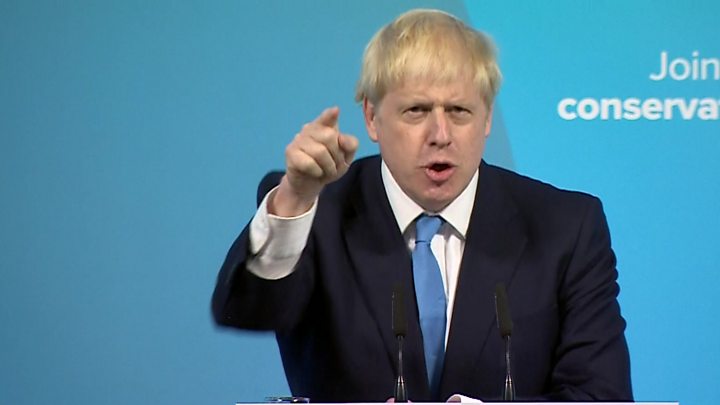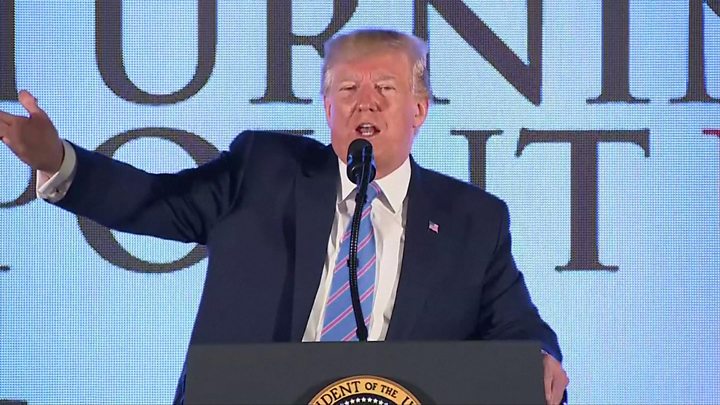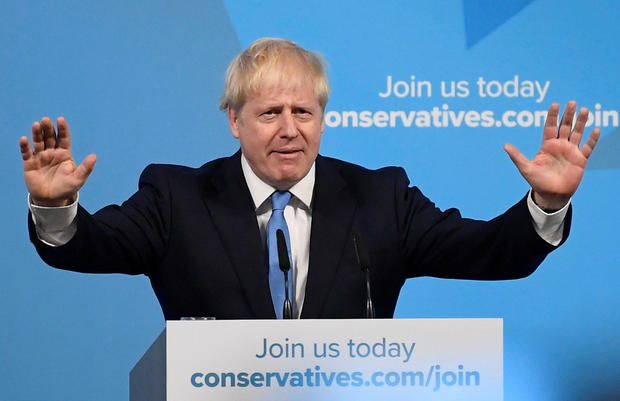
LONDON — As a boy Boris Johnson said he wanted to be "world king" when he grew up. On Wednesday, he settled for being British prime minister.
Alexander Boris de Pfeffel Johnson, known professionally as Boris Johnson, assumed office after an audience with the queen at Buckingham Palace. This followed him being chosen as leader of the ruling Conservative Party on Tuesday.
Johnson arrived at the royal palace in central London Wednesday after climate change protesters attempted to block his motorcade by forming a human chain across the road that leads to the palace gates. The protesters were quickly swept aside by police.
After meeting the queen, Britain's 77th prime minister heads to Downing Street, the official residence of Britain’s leaders, where he is expected to give a speech before appointing key members of his government.
The 55-year-old former London mayor, whose sister in an interview last year said her big brother's childhood ambition was to be "world king," may find that being prime minister of the U.K. is challenge enough.
New York-born Johnson takes office at one of the most critical junctures in Britain's post-World War II history.
The country is bitterly divided over whether and how to leave the European Union, a seemingly intractable dispute that has strained party loyalties across the political spectrum. Johnson also faces escalating tensions with Iran after Iranian commandos seized a British-flagged oil tanker in the Strait of Hormuz last week. Earlier this month, Britain seized an Iranian vessel it suspected of transporting embargoed oil to Syria.
Johnson, who has followed a well-trodden path to the top of British politics — he attended the elite boarding school, Eton College, before heading to Oxford University — will also need to try to heal a country exhausted by a decade of post-2008 financial crisis austerity.
The flamboyant journalist-turned-politician has given himself three months to deliver Brexit, with Britain due to leave the European Union on Oct. 31 — regardless of whether his government can strike a new withdrawal deal with the bloc's negotiators. He is expected to appoint a cabinet of committed pro-Brexit lawmakers, while including some pro-E.U. voices in an effort to unite the Conservatives.
Nevertheless, even with a team of true-believers, it's going to be an uphill battle. Johnson hopes to renegotiate the E.U. withdrawal deal that his predecessor Prime Minister Theresa May painstakingly hammered out with the 27 other leaders of E.U. member states.
Moments after Johnson's election, the E.U. reiterated its position that it will not reopen the divorce deal negotiated by May. If he is unable to persuade E.U. leaders to change their minds, Johnson has pledged to leave the bloc without a deal.
Many experts and industry leaders warn that "no-deal Brexit" could spell economic catastrophe for Britain, not to mention its closest European neighbors. It could also trigger shortages of food, medicine and basic supplies.
In a speech on Tuesday, Johnson's message was one of a "can do" spirit. Addressing members of the Conservative Party he pledged to unite and energize the country by delivering Brexit and defeating Labour opposition leader Jeremy Corbyn.
"We are going to get Brexit done on Oct. 31, and we are going to take advantage of all the opportunities it will bring in a new spirit of 'can do,'" Johnson said.
"Like some slumbering giant, we are going to rise and ping off the guy-ropes of self-doubt and negativity," he added, pledging to introduce "better education, better infrastructure, more police," and "fantastic full-fiber broadband."
Because of the way the U.K.'s political system works, there was no general election needed for Johnson to become prime minister. He will assume the role having won the leadership contest for the Conservative Party, which is the largest in Parliament.
Some 140,000 party members voted, with Johnson defeating his opponent, Foreign Secretary Jeremy Hunt, by 92,153 votes to 46,656.
While the pro-Brexit lawmaker is championed by his supporters for his energy and charisma, he is derided by his critics as a court jester with little regard for the truth.
In a final appearance before becoming Conservative Party leader last week, Johnson brandished a kipper — a kind of smoked herring that is a traditional British breakfast food — in front of the crowd, and claimed that "pointless" E.U. regulations had forced a fish seller on the Isle of Man to package his fish with “ice pillows.”
Within hours, European leaders pointed out that the case in question fell outside the scope of E.U. legislation. Commentators added that the Isle of Man was not actually part of the E.U.
Beyond Johnson's penchant for headline-grabbing stunts, during the leadership campaign much scrutiny focused on his tumultuous personal life.
Johnson was once fired from a senior Conservative post for lying about an extramarital affair and his reported infidelities and cover-ups would have been enough to sink most other politicians.
He has refused to answer journalists’ questions about the number of children he has. Last month at the height of the leadership campaign, Johnson’s private life was back in the headlines after a recording of “a loud altercation involving screaming, shouting and banging” at the home of his girlfriend was passed to the Guardian newspaper.
Regardless of the scandals, President Donald Trump has already voiced his support for Johnson as the next prime minister.
“I think Boris would do a very good job. I think he would be excellent,” Trump told British newspaper The Sun ahead of a state visit to the U.K. in June.
And Trump was one of the first world leaders to tweet his congratulations to Johnson on Tuesday.
For his part, Johnson has criticized Trump in the past, saying in 2015 that the then-candidate Trump was “clearly out of his mind” for suggesting that there should be a ban on Muslims entering the U.S.
More recently, however, Johnson has been reluctant to criticize the president. Earlier this month, he refused to condemn Trump’s remarks over the leaked cables of British Ambassador Kim Darroch, who stepped down from his post under pressure.
The relationship with the U.S. will be crucial for Britain as it tries to exit the E.U.
May used her last appearance as prime minister to throw her weight behind her successor and his team.
"Their successes will be our country’s successes and I hope that they will be many,” she said outside No. 10 Downing Street, the residence of Britain's prime minister.
https://www.nbcnews.com/news/world/boris-johnson-set-assume-office-britain-s-77th-prime-minister-n1033281
2019-07-24 14:43:00Z
52780336314805





